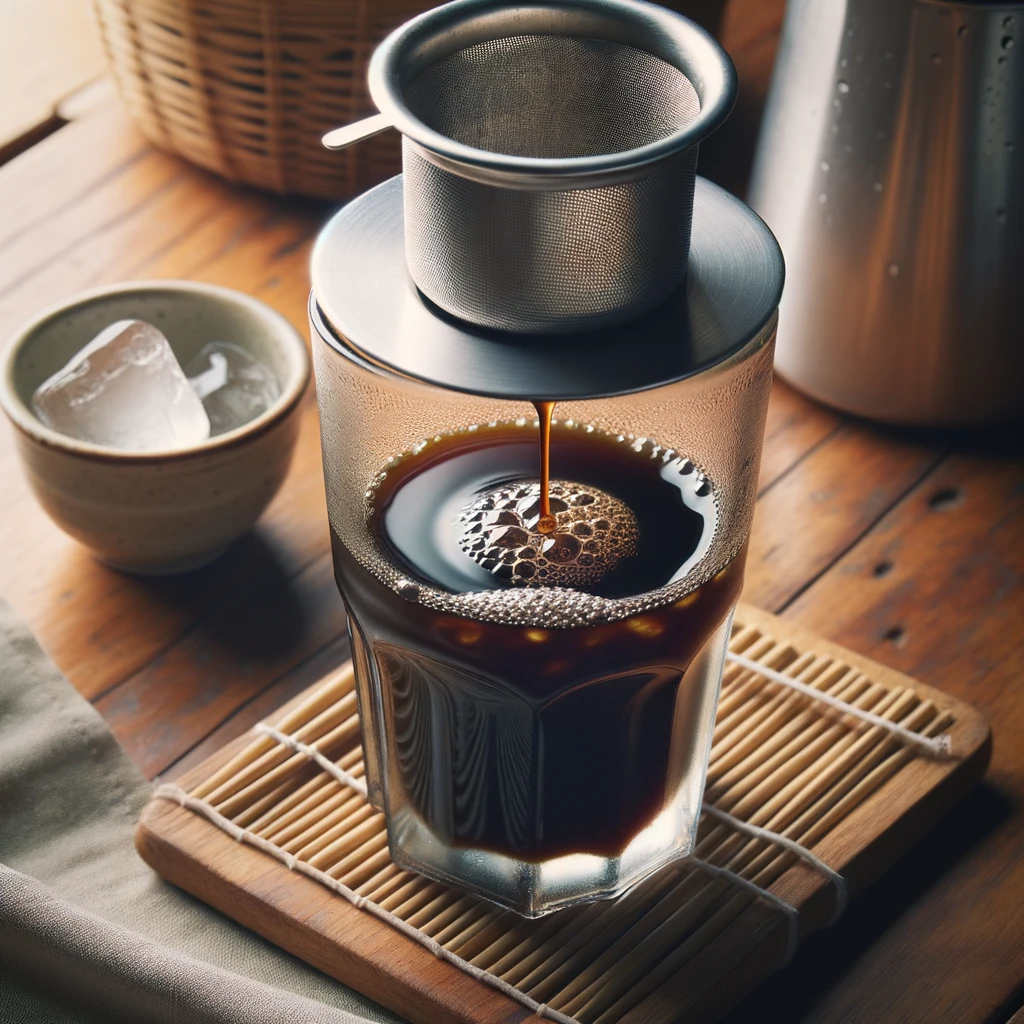This post may contains affiliate links which means I may receive a commission from purchases made through links. Learn more on my affiliate disclaimer.
If you’re a coffee lover always on the hunt for new and exciting flavors, you can’t miss the opportunity to try Vietnamese coffee. This traditional beverage is known for its bold and complex taste, unique brewing methods, and rich cultural significance.
Vietnamese coffee is made from robusta beans, which are known for their intense flavor and high caffeine content. The addition of sweetened condensed milk gives the coffee a rich and creamy texture, making it the perfect pick-me-up any time of day.
To experience the authentic taste of Vietnamese coffee, it’s essential to know the right brewing techniques and the best brands available. In this article, we’ll guide you through everything you need to know about traditional Vietnamese coffee, including recipes, filters, and brands, and explore the vibrant coffee culture of Vietnam.
Key Takeaways:
- Vietnamese coffee is made from robusta beans, known for their intense flavor.
- The addition of sweetened condensed milk gives the coffee a rich and creamy texture.
- Authentic Vietnamese coffee requires specific brewing techniques and the use of a Vietnamese coffee filter (phin).
- There are many excellent Vietnamese coffee brands available in the US market, each with its unique offerings and flavor profiles.
- Vietnamese coffee is an integral part of the country’s culture and is enjoyed in many different social contexts.
The History of Vietnamese Coffee
Immerse yourself in the fascinating history of Vietnamese coffee and its cultural significance. Vietnamese coffee culture has been shaped by various influences, resulting in a unique and beloved beverage.
Coffee was introduced to Vietnam in the 19th century by French colonists. At first, coffee was mainly consumed by the French community, but Vietnamese people soon developed a taste for the beverage and began to cultivate their own coffee beans.
During the 20th century, Vietnam went through a period of war and economic hardship. Despite the challenges, coffee remained an important aspect of daily life and the economy. The government began to invest in coffee production as a means of boosting the country’s economy, and Vietnam soon became one of the world’s leading coffee producers.
Nowadays, coffee is an integral part of Vietnamese culture, with cafes and coffee shops serving as social hubs for gatherings and conversations. The traditional Vietnamese coffee shop is called a “ca phe sua da,” which means “coffee, milk, and ice.”
“Vietnamese coffee is one of the few beverages that has the power to bring everyone together. The coffee shops are like community centers, where people share stories, discuss current events, and enjoy each other’s company.”
-Lien Nguyen, Vietnamese Coffee Expert
Vietnamese coffee culture emphasizes the importance of taking time to enjoy the beverage and savoring its rich flavors. It is common to see people taking a break from work or daily activities to enjoy a cup of coffee with friends or family.
Now that you’ve learned about the history and cultural significance of Vietnamese coffee, it’s time to explore what makes this beverage so special. Read on to discover the unique characteristics of Vietnamese coffee that make it stand out from other varieties.
What Makes Vietnamese Coffee Special
Traditional Vietnamese coffee is a unique and beloved beverage that has won the hearts of coffee drinkers around the world. Its rich flavor and aroma are achieved through a combination of factors, including the beans used and the brewing process. Here’s what sets Vietnamese coffee apart:
Vietnamese Coffee Beans
The key to Vietnamese coffee’s distinct flavor is the beans used. Typically, robusta beans are used in Vietnam, which have a stronger and more bitter taste compared to arabica beans commonly used in other parts of the world. The beans are usually roasted with a small amount of butter or oil, which gives the coffee its signature nutty flavor.
Traditional Vietnamese Coffee
The traditional brewing process involves using a small metal filter called a “phin.” The phin sits on top of a cup or glass, and the coffee grounds are placed inside along with boiling water. The water slowly drips through the grounds over a period of several minutes, resulting in a strong and concentrated coffee that is often enjoyed with sweetened condensed milk.
Another unique feature of Vietnamese coffee is the addition of egg yolk. This is a popular variation in the northern part of the country, where egg yolks are whisked with sugar before being added to the hot coffee, resulting in a creamy and rich texture.
Overall, the combination of robusta beans and the phin brewing method creates a bold and flavorful coffee that is distinctively Vietnamese.
Brewing Vietnamese Coffee at Home
If you want to experience the rich flavors of authentic Vietnamese coffee from the comfort of your own home, learning how to brew it is essential. Here are some simple steps to create your perfect cup of Vietnamese coffee.
Ingredients:
- 2 tablespoons of Vietnamese coffee grounds
- 3 tablespoons of sweetened condensed milk
- Hot water
Equipment:
- Vietnamese coffee filter (phin)
- Coffee cup
- Hot water kettle
- Stirrer (optional)
Instructions:
- Boil water in the kettle and wait for it to cool for about a minute. You want the water to be around 200°F.
- Place the Vietnamese coffee filter on top of the coffee cup.
- Add the Vietnamese coffee grounds to the filter, spreading them out evenly.
- Use the stirrer to level the grounds.
- Pour a small amount of hot water (about 2 tablespoons) into the filter to wet the coffee grounds and let them soak for a few seconds.
- Add the sweetened condensed milk to the coffee cup.
- Place the filter on top of the cup and add the remaining hot water (about 4 oz) to the filter.
- Wait for the coffee to drip completely (around 5-10 minutes).
- Stir the coffee and condensed milk together and enjoy!
Using a Vietnamese coffee filter (phin) is crucial in brewing authentic Vietnamese coffee. It is a small, metal filter that sits on top of the coffee cup and allows the hot water to drip through the coffee grounds slowly, resulting in a robust and flavorful brew.
You can also experiment with different variations of the recipe by adjusting the amount of coffee grounds or sweetened condensed milk to your liking.
Top Brands for Vietnamese Coffee
If you’re looking to experience the authentic taste of Vietnamese coffee, it’s essential to choose the right brand. Here are some of the best Vietnamese coffee brands available in the US market:
| Brand | Features |
|---|---|
| G7 | Single-serve packets of instant coffee with a smooth, bold flavor |
| Trung Nguyen | One of the most popular Vietnamese coffee brands worldwide, with a range of roasts and blends for every taste |
| Len’s Coffee | Small-batch roasts using high-quality Vietnamese coffee beans |
| Chestbrew | Eco-friendly and sustainably sourced beans, with a smooth and nutty flavor |
| Passiona | 100% pure Robusta beans sourced from Vietnam’s Central Highlands, with a bold and robust flavor |
Each brand has its unique characteristics, so it’s worth experimenting with a few until you find your perfect match. Whether you prefer a smooth and mild taste or a bold and robust flavor, there’s a Vietnamese coffee brand that will satisfy your taste buds.
To find the best Vietnamese coffee for you, try comparing different brands and roasts. Pay attention to the country of origin and the type of beans used in each blend. With some experimentation, you’ll soon discover your favorite Vietnamese coffee brand and the best way to enjoy it.
Vietnamese Coffee Culture and Traditions
Vietnamese coffee is more than just a beverage; it’s a significant part of the country’s social fabric and cultural identity. To truly appreciate Vietnamese coffee, you must understand the customs, traditions, and rituals that surround it.
One of the most notable aspects of Vietnamese coffee culture is the importance of coffee shops in daily life. These establishments are not merely places to grab a quick cup of coffee; they are social hubs where people gather to catch up with friends, conduct business meetings, or simply relax. It’s common to see locals spending hours in coffee shops, sipping on their coffee while reading the newspaper or chatting with fellow coffee enthusiasts.
In Vietnam, coffee is not just a morning pick-me-up; it’s a beverage that can be enjoyed at any time of day. In fact, it’s not unusual for people to drink coffee late into the evening, as many Vietnamese believe that the caffeine content of coffee helps keep them awake and alert.
Another unique aspect of Vietnamese coffee culture is the use of the Vietnamese coffee filter, known as a phin. This simple but effective device is used to make traditional Vietnamese coffee, and it has become an iconic symbol of the country’s coffee culture. The phin consists of a small metal filter placed over a cup or mug, with the coffee grounds added to the filter before hot water is poured over it. The coffee then slowly drips through the filter, producing a rich and flavorful brew.
“Vietnamese coffee culture is steeped in tradition and ritual, and it’s a vital part of the country’s social fabric.”
When it comes to serving Vietnamese coffee, there are also some unique customs to be aware of. In Vietnam, coffee is traditionally served with a side of sweetened condensed milk, which is added to the coffee to create a sweet and creamy taste. Some variations of Vietnamese coffee, such as egg coffee, also include ingredients like fresh egg yolk or coconut milk.
Finally, it’s worth noting that coffee production is an essential part of Vietnam’s economy and history. Vietnam is the second-largest coffee-producing country in the world, with coffee plantations scattered across the central highlands region. The country’s coffee industry has experienced tremendous growth in recent years, and today, Vietnamese coffee is exported to countries all over the world.
In summary, Vietnamese coffee culture is steeped in tradition and ritual, and it’s a vital part of the country’s social fabric. To truly appreciate Vietnamese coffee, it’s essential to understand the customs, traditions, and history that make it so special. From the use of the Vietnamese coffee filter to the importance of coffee shops in daily life, Vietnamese coffee reflects the unique culture and identity of this fascinating country.
Health Benefits of Vietnamese Coffee
If you’re a coffee lover, you’ll be happy to know that Vietnamese coffee not only offers a tasty treat, but it also has potential health benefits.
According to recent studies, coffee drinkers may have a lower risk of developing health conditions such as Parkinson’s disease, type 2 diabetes, and liver cancer. Vietnamese coffee, in particular, may be beneficial due to its high caffeine content and the use of robusta beans, which contain a higher level of antioxidants compared to arabica beans.
In addition, Vietnamese coffee’s caffeine content may provide energy-boosting effects, helping you feel more alert and focused throughout the day. But remember, moderation is key, as excessive consumption of caffeine can have negative effects on your health.
One way to enjoy the potential benefits of Vietnamese coffee without overdoing it on caffeine is to try decaf versions, which are available from some brands.
Overall, while more research is needed to fully understand the health benefits and potential risks of coffee consumption, enjoying a cup of authentic Vietnamese coffee in moderation may offer some positive effects for your overall well-being.
Vietnamese Coffee and Dessert Pairings
When it comes to pairing Vietnamese coffee with desserts, the possibilities are endless. The rich, bold flavors of Vietnamese coffee can complement a wide range of sweet treats, from delicate pastries to rich chocolate cakes.
One classic pairing is the traditional Vietnamese dessert known as che, which is a sweet soup made with various ingredients such as beans, jelly, fruit, and coconut milk. The sweetness of the che pairs perfectly with the strong, bitter notes of Vietnamese coffee, creating a balanced and flavorful experience.
Another popular dessert pairing is the French-inspired Vietnamese pastry, bánh patê sô, which is a flaky, savory pastry filled with pork or chicken and topped with a buttery egg custard. The savory flavors of the pastry work well with the bold, complex notes of the coffee, creating a satisfying contrast of flavors.
If you prefer a lighter dessert, consider pairing Vietnamese coffee with fresh fruit. The sweetness of the fruit can complement the bitterness of the coffee, creating a refreshing and satisfying combination.
Pairing Ideas
If you’re looking to experiment with your Vietnamese coffee and dessert pairing, consider some of these unique ideas:
| Dessert | Pairing Notes |
|---|---|
| Bánh Flan | The creamy texture of the caramel custard pairs well with the smooth and rich flavor of Vietnamese coffee. |
| Coconut Macaroons | The tropical flavor of coconut complements the bold, nutty flavor of Vietnamese coffee. |
| Dark Chocolate Mousse | The bitter notes of the dark chocolate complement the strong, robust flavors of Vietnamese coffee, creating a luxurious and indulgent pairing. |
| Green Tea Mochi | The subtle sweetness and chewy texture of the mochi enhances the complexity of the coffee flavor, creating a unique and delicious pairing. |
Experimenting with different desserts and Vietnamese coffee brands can lead to discovering exciting and unexpected flavor combinations. Give it a try and see which pairing becomes your new favorite!
Vietnamese Coffee in Popular Culture
Vietnamese coffee has not only gained popularity in the world of coffee enthusiasts but has also made its mark in popular culture. This traditional beverage has appeared in various forms of media, from movies and literature to art and music.
In the movie “The Scent of Green Papaya,” Vietnamese coffee played a significant role in the plot as a symbol of the protagonist’s desire for a better life. The film showcased the traditional brewing method using a Vietnamese coffee filter (phin) and highlighted the coffee’s unique flavor and aroma.
“In Vietnam, we have a saying, ‘Bitter coffee, sweet life.’ It means that the bitterness of the coffee represents the struggles in life, but when you add sweetened condensed milk, it symbolizes the joys and happiness that make life worth living.” – The Scent of Green Papaya
Vietnamese coffee has also inspired literature, particularly in the works of Vietnamese-American author Viet Thanh Nguyen. In his Pulitzer Prize-winning novel “The Sympathizer,” the protagonist professes his love for Vietnamese coffee, describing it as “the black blood of Vietnam.”
Artists have also been influenced by the culture surrounding Vietnamese coffee. Vietnamese-American artist Christine Nguyen created a series of paintings inspired by the coffee’s unique blend of robusta and arabica beans, while Vietnamese artist Trong Gia Nguyen incorporated a coffee filter into his sculpture “Legs for Days.”
In music, Vietnamese coffee has been referenced in the song “Cà Phê Đen” by Vietnamese singer Thùy Chi. The lyrics describe the experience of sipping black coffee alone and reflect on the bittersweet nature of life.
Overall, Vietnamese coffee’s cultural significance and unique flavor have left an indelible mark on popular culture. Its appearance in media, literature, art, and music serves as a testament to its enduring popularity and rich traditions.
Vietnamese Coffee Events and Festivals
Immerse yourself in the vibrant world of Vietnamese coffee by attending one of the many events and festivals celebrating this beloved beverage.
Vietnam Coffee Festival
The Vietnam Coffee Festival takes place annually in Buon Ma Thuot, the country’s coffee capital. This three-day event brings together coffee growers, producers, and enthusiasts from all over the world to celebrate the unique flavors and culture of Vietnamese coffee. Enjoy coffee tastings, demonstrations, and performances showcasing the country’s coffee heritage.
Vietnam International Cafe Show
The Vietnam International Cafe Show is a must-attend event for coffee lovers and industry professionals. Held in Ho Chi Minh City, this three-day event features exhibitors from around the world showcasing the latest trends and technologies in the coffee world. Attend seminars, competitions, and tastings to learn more about coffee culture and innovation.
Vietnamese Coffee Day
Celebrate Vietnamese Coffee Day on December 10th, an official holiday in Vietnam. Coffee shops and businesses across the country offer discounts and promotions, making it the perfect time to try new blends and flavors of Vietnamese coffee.
Vietnamese Coffee Fair
The Vietnamese Coffee Fair takes place in Hanoi, bringing together coffee growers, roasters, and traders to showcase the best coffee products from around the country. Sample unique blends and learn about the cultural significance of coffee in Vietnam.
- Experience the vibrant culture and flavors of Vietnamese coffee at one of these events and festivals.
- Taste unique blends, attend seminars and demonstrations, and immerse yourself in the rich traditions of Vietnamese coffee.
- Don’t miss the opportunity to celebrate Vietnamese Coffee Day on December 10th, and discover new brands and flavors at the Vietnam International Cafe Show or the Vietnamese Coffee Fair.
Vietnamese Coffee Tips and Tricks
Now that you’ve immersed yourself in the world of Vietnamese coffee, it’s time to take your coffee brewing skills to the next level. Here are some expert tips and tricks to help you achieve the perfect cup:
- Use high-quality Vietnamese coffee beans: The quality of your coffee beans will directly impact the taste and aroma of your coffee. Look for beans that are fresh, roasted to perfection, and sourced from reputable farms.
- Invest in a Vietnamese coffee filter (phin): The phin is a traditional Vietnamese coffee filter that allows the coffee to steep slowly, resulting in a rich and flavorful cup. It’s an inexpensive investment that will make a world of difference.
- Experiment with the coffee-to-water ratio: The ideal coffee-to-water ratio is typically 1:1 or 1:2. However, feel free to experiment with different ratios to find the perfect balance for your taste preferences.
- Adjust your brewing time: Brewing time can vary depending on the coffee-to-water ratio, the type of coffee beans used, and your personal taste preferences. Start with a brewing time of 4 to 5 minutes and adjust as needed.
- Store your coffee beans properly: To preserve the freshness and flavor of your coffee beans, store them in an airtight container in a cool, dry place away from direct sunlight.
- Grind your beans just before brewing: For the freshest cup of coffee, grind your beans just before brewing. This will help you achieve the perfect flavor and aroma.
By following these tips and tricks, you’ll be well on your way to brewing the perfect cup of authentic Vietnamese coffee.
Conclusion
Congratulations on completing your journey into the rich world of Vietnamese coffee. Armed with your newfound knowledge, you can now enjoy the distinct flavors and aromas of this traditional beverage from the comfort of your home in the US.
Remember, Vietnamese coffee is more than just a drink. It’s a way of life that has been ingrained in the Vietnamese culture for centuries. Whether you’re sipping it alone or sharing it with friends, take a moment to appreciate the unique experience that this delightful beverage provides.
Final Tips
Before you go, here are some final tips to enhance your Vietnamese coffee experience:
- Invest in a quality Vietnamese coffee filter (phin) to achieve the perfect brew.
- Experiment with different brewing techniques and recipes to find your ideal balance of flavor and strength.
- Store your Vietnamese coffee beans in a cool, dry place to preserve their freshness.
- Pair your Vietnamese coffee with a traditional Vietnamese dessert for a complete sensory experience.
- Engage with the vibrant Vietnamese coffee community by attending events and festivals.
Thank you for joining us on this journey. We hope you enjoyed learning about the history, traditions, and flavors of authentic Vietnamese coffee. Now, go forth and indulge in the delights of this delectable beverage.
FAQ
What is Vietnamese coffee?
Vietnamese coffee refers to the traditional coffee preparation and brewing methods used in Vietnam. It is known for its dark and intense flavor, often brewed with a special Vietnamese coffee filter called a phin.
What makes Vietnamese coffee special?
Vietnamese coffee is unique due to its use of robusta coffee beans, which give it a distinct flavor and higher caffeine content. The brewing process using a phin filter also contributes to its rich and full-bodied taste.
How can I brew Vietnamese coffee at home?
To brew Vietnamese coffee at home, you will need a Vietnamese coffee filter (phin) and finely ground coffee. Place the filter on top of a coffee cup, add coffee grounds, and pour hot water over it. Let it drip slowly and enjoy!
What are some popular Vietnamese coffee brands?
Some popular Vietnamese coffee brands available in the US market include Trung Nguyen, Café Du Monde, and Vinacafe. Each brand offers its own unique blends and flavors for you to explore.
Are there any health benefits associated with Vietnamese coffee?
Vietnamese coffee, like other types of coffee, contains antioxidants that can contribute to overall well-being. It may also provide an energy boost and potentially improve mental focus.
What are some traditional Vietnamese coffee and dessert pairings?
Traditional Vietnamese coffee is often enjoyed with sweet treats like condensed milk, coconut milk jelly, or flan. These pairings complement the rich flavors of the coffee and create a balanced taste experience.
How has Vietnamese coffee influenced popular culture?
Vietnamese coffee has made its mark in movies, literature, art, and music, showcasing its cultural significance and the delight it brings to people’s lives. It has become synonymous with Vietnamese identity and tradition.
Are there any Vietnamese coffee events or festivals?
Yes, there are various events and festivals dedicated to Vietnamese coffee. These gatherings celebrate the coffee culture and provide opportunities for enthusiasts to learn, taste different brews, and engage with the Vietnamese coffee community.
Do you have any tips and tricks for brewing Vietnamese coffee?
Some tips for brewing Vietnamese coffee include using freshly roasted beans, adjusting the coffee-to-water ratio to your taste preference, and experimenting with different brewing times. It’s also essential to store your coffee properly to maintain its freshness.





